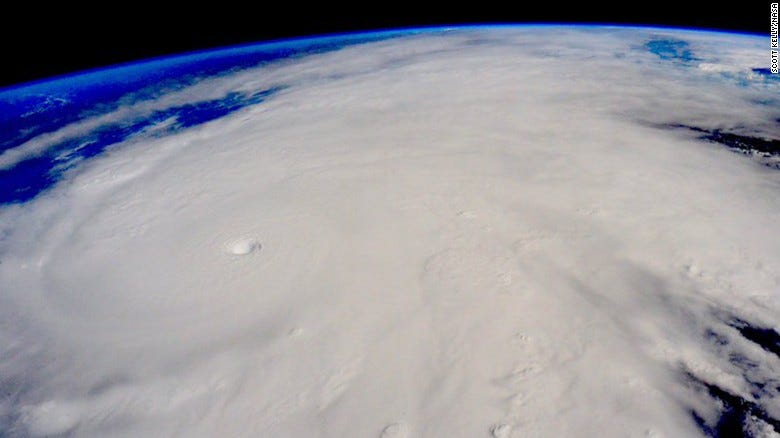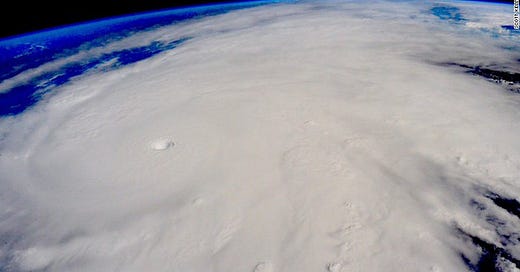When Politics Overwhelm Compassion
When I'm driving, I like to listen to an audiobook, a podcast, or talk radio. On long rides, I'll cycle through these three. And so, while traveling out of state on Friday afternoon, I turned on the radio and tuned in to a conservative talk radio show.
I don't mentioned it often on this blog, but I am politically conservative. I rarely listen, though, to the talk shows. This day was a rare exception. I hoped that listening to the show would make the first hour of the trip go by quickly, and then I could switch to an audiobook or a podcast to stave off boredom.
Within minutes, though, I turned off the radio.
The host began talking about Hurricane Patricia, which at that time was the most powerful hurricane ever recorded and headed for Mexico. Thankfully, the hurricane hasn't been as devastating as expected. The news reports I've read said there were not any recorded casualties. That's a tragedy averted.

Source: CNN.com
But the host didn't bring up the hurricane to express his concerns for the people, to lament the predicted devastation, or to encourage his enormous national audience to look for ways to assist afterwards. (Yes. I understand that political talk shows focuses more on rhetoric than on organizing the massive audience.)
Instead, the host went on to say that the hurricane was getting so much attention and being so hyped, not because it was actually a potential disaster, but because the liberals were using it for two things. In fact, he said that they were waiting for "another Katrina."
Why were the liberals and the mainstream media hyping the hurricane?
First, the host said "they" were wanting another powerful and devastating hurricane as proof that global warming is truly a threat. I don't think that he elaborated upon who "they" are.
Second, they said that "they" were eagerly expecting refugees from the hurricane who the U.S.A. would have to help. In other words, "they" were looking forward to a North American refugee crisis that will force the U.S. government to welcome additional Mexicans into our country.
In other words, the host looked at Hurricane Patricia –– which had the potential to kill hundreds, maybe thousands, of people –– and accused liberals of welcoming this tragedy because they could reap political benefits from it. ` For the moment, can we set aside the question of whether the host was correct? (Were there a group of liberals who welcomed a devastating social disaster? Part of the problem with such statements is that they are so vague. Who is the "they" who eagerly awaited a destructive natural disasters? I can say "they hate me and oppose me," but if I don't define who "they" are, then it is hard to disprove my claim. So I don't know how to show that the host was wrong without exhaustively showing that no liberal exists in the U.S. who holds these beliefs.)
So, setting aside the question of whether the host was correct, ask yourself: What does this do to one's soul to react this way to a disaster in which hundreds of innocent people could have been killed?
I enjoy politics much more than the average person. I love election season and the debate and strategy that surrounds it. I like reading the biographies of influential political people. But I think that we have to be careful about how we immerse ourselves into politics. People among the political right and the political left cannot allow our political positions to justify treating people without basic dignity and respect. It can habituate our hearts and souls to treating people as less important than our political goals or opinions. We become calloused, angry, reactive.
You might think that the host's claims were justified, at least, because it showed that he was being suspicious and on-guard against the political maneuvering and strategies of the liberals. (If you are politically liberal, perhaps you disagree with the host's politics but believe liberals are justified in similar suspicion against conservatives.) But such suspicious strategizing belongs to war, not to disagreements within a society. Think about the damage it does to our society if we all view each other suspiciously, if we cannot even respond to a potentially devastating natural disaster with compassion and concern for human life, but only with political rhetoric, accusations, and strategy.
This will not only damage our souls, but it'll damage our society.
As I said earlier, I am politically conservative. I believe that we face serious issues in our society. I think the Church's voice needs to be heard, and Christians should not shrink from being socially and politically active. But we cannot let our political and social activism override the basic Christian virtues of honesty, love, compassion, and generosity. These virtues are not consistent with reacting to a natural disaster the way the radio host did.
We cannot let our politics overwhelm our compassion.



